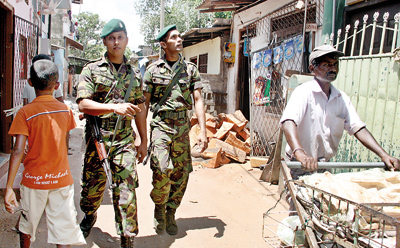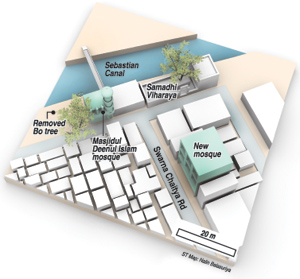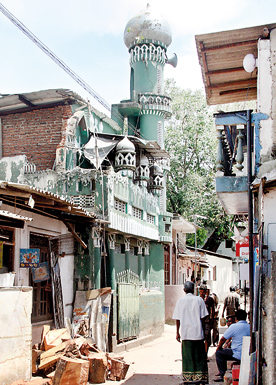News
Grandpass: A commitment to peace after ugly clashes
It was time for Friday prayers but the old mosque on Swarna Chaitya Road in Molawatte, Grandpass, stayed empty last week. Hunks of wood, sawn off the Bo tree that had overshadowed its minarets for many years, were piled outside the door. There were no devotees at the disputed new mosque —or “prayer centre” — either. It stood across the street, with its windows shattered and an armed Special Task Force policeman at its gate.

A week after: The scene on Friday with soldiers patrolling the area. Pix by Indika Handuwala
On this day, Muslims from Molawatte performed Jumma prayers at another mosque. “Leaves and pieces of wood from the Bo tree had fallen into the old mosque while it was being cut,” explained M K B Dissanayake, Secretary to the Ministry of Buddha Sasana and Religious Affairs. “So as a temporary measure, they went to a mosque in the next lane.”
The riot squad had been deployed following fears that clashes would erupt after prayers. More policemen were on duty near the Swarna Chaitiya Temple and the Samadhi Viharaya. All these centres of worship are located in close proximity to each other.
Just a week ago, on August 10, Molawatte had been the site of angry clashes between Muslim devotees and Sinhalese protesters who attacked the new mosque while dusk prayers were in progress. Worse, it was a day after the Eid festival.
The mob shattered the windows of the three-storey structure and caused damage to surrounding houses using wooden poles, stones and other objects. They demanded that the centre be closed down and that devotees immediately return to the old Masjidul Deenul Islam Mosque. Faced with police inaction, community heads struggled to contain the violence. The Muslims fought back.
Amidst rising tempers, a short message from an unknown source circulated among some Muslims via mobile phone, urging them to rush to the mosque as its Imam and his aide had been murdered by Sinhala demonstrators.
A mosque trustee received calls from international news agencies which wanted to confirm news of the killings which never took place. It was clear that interested parties from both sides were stoking the fires, this trustee said last week. Several persons were injured in the melee which was captured on a closed circuit television camera installed in a house nearby. It took intense discussions at political and village level, involving President Mahinda Rajapaksa, several ministers, religious leaders, police and many officials, to bring the situation under control.
For the first time, Muslim ministers issued a joint statement urging the President and the Government, of which they are members, “to take decisive action to halt this trend of openly espousing religious hatred towards the Muslim community”. On Friday, Molawatte was returning to business. A three-wheeler driver, who picked up a hire near the mosque, gibed at journalists: “You all are just waiting for some trouble to start, aren’t you?”

Meanwhile, the trustees of Masjidul Deenul Islam – the old mosque at Molawatte — together with the All Ceylon Jamiyyathul Ulema and Muslim ministers last week took an extraordinary measure to prevent further discord. They issued a statement that was posted on the notice boards of all of the country’s mosques. It appealed for calm in order to prevent a major conflict between communities.
“We give you assurance that similar incidents will not be repeated,” it said. “We have taken a joint decision with the Buddhist clergy in our immediate neighborhood to maintain harmony. We will continue to expand the old mosque.”
“We, the All Ceylon Jamiyyathul Ulama and the Muslim ministers are closely monitoring the recent attacks on Muslim religious centres,” it added. “We make a humble appeal not to spread negative rumours as it could lead to a worse situation.”Efforts are also being made on the Sinhala side to restore peace and order. “Things are settled now,” maintained Ven. Bopelesse Anuruddha Thera, Chief Incumbent of the Samadhi Viharaya. He was after several rounds of meetings with officials, police and community representatives aimed at evolving measures to avert further unpleasantness.
“In any case, there was never a problem among the Sinhalese and Muslims of this area,” Ven Anuruddha Thera now says. “The trouble was created by outsiders.” Representatives of the Muslim community, too, insisted that the violence had been triggered by outsiders (whom they refused to identify) and that the residents of Molawatte had cohabited for centuries without friction.
“By God’s grace, the Muslims, the Sinhalese, the Tamils and the Burghers have always lived here in peace,” said Abdulla Abdul Hameed, a trustee of the Masjidul Deenul Islam Mosque. “The Swarna Chaitya Temple is built against the wall of my family home. Muslims donate generously towards the construction of the Grandpass ‘thorana’ and our people unfailingly attend its official unveiling every year.”
Muslims also participate in the opening of “dansal” on their streets. “But because we don’t sit there and eat, the organisers send parcels of food to the main Muslim families,” Mr. Hameed said. “During Ramazan, we make our pot of Kanjee at the entrance to the mosque because it’s too cramped inside. The Sinhalese help and we share the kanjee with the whole village.”

The old mosque now open for prayers
Underneath the surface, however, tensions had been simmering over plans to relocate the old mosque from Number 166 to number 158 on Swarna Chaitya Road. The Muslim population in the area had increased to more than 400 families compared to around 150 Sinhala families that live there.
The old Masjidul Deenul Islam Mosque, dating back to the 1960s, was built on 1.3 perches of land. It is crammed into a narrow space bordering the putrid Sebastian Canal and the Bo tree that towered over the mosque had hindered any extension of the small structure.
In 2009, after one effort to have the Bo tree felled had failed, the mosque trustees decided to shift. They were also concerned because they had received a notice from the Urban Development authority dated 1995 saying the land on which the Masjidul Deenul Islam stood was acquired for development purposes.
A stone’s throw away, a Muslim businessman had bought a five-perch plot of land on which he had constructed a warehouse. He came under pressure from his community to allow the property to be used as a mosque. But the Chief Incumbents of the two Buddhist temples lodged police complaints against what they saw as an attempt to open two mosques in one crowded neighborhood. This is where the trouble started.
By 2011, the businessman put his land up for sale. A Muslim lawyer in Wellawatte bought it and donated it in his father’s name to the Masjidul Deenul Islam Mosque. In 2012, the new venue was registered by the official Wakf Board, the governing body of all mosques. But the matter did not end there; the police continued to receive complaints.
The Buddha Sasana and Religious Affairs Ministry, which had initially given permission for the relocation of the mosque, withdrew it. Then it authorised the use of the new premises during the Ramadan fasting period but said it must be closed down by August 10. Finally, on encouragement by some Muslim ministers, the Ministry issued a fresh letter saying the mosque could continue at the former warehouse even after the festival.
“We did not communicate the contents of that final letter to anyone because we knew that, under the circumstances, it could cause a big fight,” said Mr. Hameed. “We were ready to leave the mosque by the morning of August 11. Villagers know that we had washed the floors of the mosque and prepared it for us to move back. The sadhus were also happy.”
“But we had time since the deadline had not lapsed so we conducted the last prayer on Saturday evening,” he explained. “It was then that the attack took place.”
Yet, the final letter did leak out to both the Sinhala and Muslim communities. “Somebody got a copy of the letter and gave it to the people,” Mr. Hameed admitted. “We don’t know who did it.”
Ven. Anuruddha Thera laid the blame on a Muslim politician from the United National Party. “Nobody knew that permission had been given to continue the mosque,” he said. “But this politician told the Muslims and some of them lit firecrackers here. They shouted that they don’t have to shift and they will continue to stay here because they had the authority.”
This enraged the Sinhalese, thrusting months of latent animosity over the “two mosques” to the surface. In the meantime, Muslims, who had suffered a large number of attacks on mosques and prayer centres in recent months, showed an unwillingness to back down.
It is unlikely that Molawatte will see any violence in future, Mr. Hameed and Ven Anuruddha Thera both predicted last week. The Bo tree is no longer standing. And the old mosque is to be renovated and expanded with Government assistance, something the Buddhist prelates have consented to.
Follow @timesonlinelk
comments powered by Disqus

